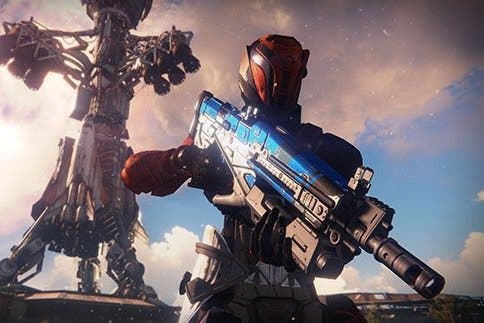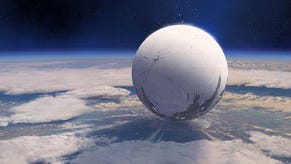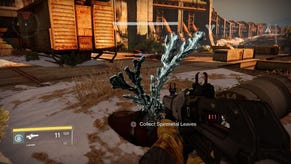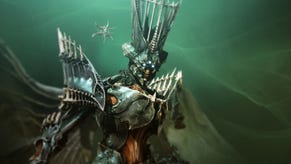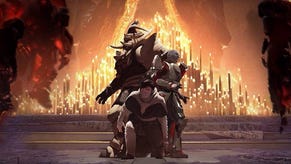Bungie's date with Destiny approaches
It's been a long journey, but for the creator of Halo the end is in sight.
Remember the contract between Activision and Bungie for Destiny, published in 2012 as part of the lawsuit between Activision and Call of Duty creators Jason West and Vince Zampella? It said Destiny would launch in the autumn of 2013 as a timed Xbox exclusive.
Oh, how things have changed.
Rather than launch first on Xbox in autumn of 2013, Destiny will launch simultaneously on PlayStation 4, PlayStation 3, Xbox One and Xbox 360 on 9th September 2014. And where there were timed exclusive deals in place with Microsoft, the pendulum has now swung towards Sony. Destiny's beta will launch first on PlayStation platforms this summer, and expect exclusive content and DLC on Sony's console, too.
So, contracts change. And so has Bungie.
Any game made over five years will see change, and Bungie's seen a few high-profile staff leave during the development of Destiny. In September 2013 design director Joseph Staten left Bungie for Microsoft after 15 years at the Halo creator. And just last month celebrated composer Marty O'Donnell left, or, in his words, was "terminated without cause".
When I ask design lead Lars Bakken what's gone on internally since February last year - when Bungie invited press into the studio to discuss the game - he replies: "What hasn't gone on internally?!"
"Jones laid out what these core pillars of the game are. It's one thing to say these are the things we care about, these are the things that should never change, it's more than a disc in your drive, it's a place you want to go and be in and spend time in, those things are so important. It's taking the embodiment of those things and creating them into a game that still fits within those pillars but is awesome in its own right.
"What have we been doing? We've been trying to fit within those pillars but still make this amazing experience and do things no-one's done before, and try to innovate in ways that people will play it and go, wow, 'I didn't even realise it was going to be awesome to be in a public space and start shooting this thing and get into trouble and realise a dude could come and help me out.'
"That happened to me over the weekend. I helped out a dude who was lower level. We've been playing from our home PS4s and it was just an amazing experience. I talked to that guy the next day and he was like, 'I couldn't believe when you showed up because I was totally going to lose this public event, and you showed up and kicked the crap out of this Fallen Captain that was about to kill me.'
"Those kinds of experience just happen randomly. You can't control that stuff. That's one of the cooler experiences that happens in Destiny."
"It's taking the embodiment of those things and creating them into a game that still fits within those pillars but is awesome in its own right."
Destiny design lead Lars Bakken
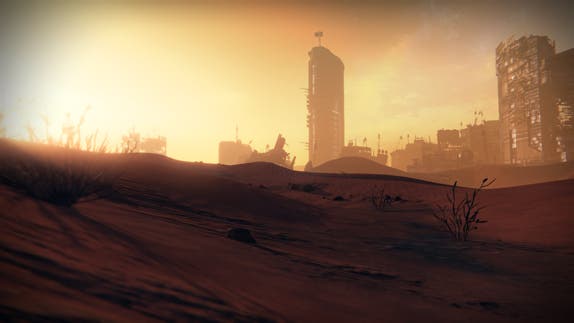
It's a lofty ambition, for sure, this concept of a shared-world shooter. The idea that you're never playing alone, even if you think you are. This idea of a Borderlands-style first-person shooter co-op experience fused with World of Warcraft-style MMO mechanics.
Perhaps it's no wonder to hear Bakken admit it's been hard turning all of Destiny's promise into reality - into a video game that is real and that will ship.
"It's been hard, yeah," he says. "Hitting that promise of activities for every mood, which we've hit on multiple times. You've heard us say that so many times, but it's true at this point.
"If I'm feeling in the mood to shoot other Guardians in the face, I have that option. If I just want to upgrade my current full-auto rifle because I love it, and I look at it and I'm like, 'I can't wait to get to node three on this thing,' I go and do a patrol, and I hang out in the Cosmodrome or hang out on the moon and I just freeroam, do whatever I want to do and take jobs from the city and just shoot aliens in the face for hours and have a good time doing it.
"It's been executing on those things and making them into what we would consider a Bungie quality game and not compromising on that."
Bungie COO Pete Parsons tells me the developer formally kicked off the Destiny project in August of 2009, but "we've been working on it even longer than that". It's a huge endeavor, sparked by Bungie's elusive creative genius Jason Jones, fuelled by millions of Activision dollars and ground out by over 500 staff busy building the mythic science fiction world everyone involved with the project hopes will keep gamers entertained for a decade.
By the time the game comes out, it'll have been in production for five years with an ever expanding team. You'd think it would be difficult keeping everyone involved focused on the singular creative vision. You'd think it would be difficult for Bungie to stay on target, but Bakken says that part's been easy because of the way the studio is structured.
The people in charge of the various aspects of the game, from investment to competitive multiplayer, work with Jason Jones on a daily basis. They're constantly talking with him about their specialisms - Bakken included. He's in charge of PvP. Then there's the sense of open communication. Bungie has a flat floor plan - a huge space built into the studio's repurposed Bellevue bowling alley office that's packed with desks, but there are no walls. "That makes it a lot easier," Bakken says. And there's the lab, Bungie's user testing space in which people play the game over and over again. Each screen has a webcam attached so Bungie can record people's reactions to the game. There's an enormous amount of data to analyse, but, hopefully, it should make for a better Destiny.
"They believed in that vision and wanted us to take the time to get it right. That's a huge deal that goes all the way up to Thomas Tipple and Bobby Kotick and the board of their company."
Bungie COO Pete Parsons on its relationship with publisher Activision
I get the impression Activision has a somewhat hands-off approach to Destiny, letting Bungie do its thing to a large degree, but you wouldn't blame the mega publisher for sticking its oar in every now and then. After all, it's pumped hundreds of millions into the project - for an IP it has the exclusive rights to distribute, but does not own.
And remember, Destiny was once due out in autumn 2013, and then in spring 2014. So I wonder if Activision might have knocked on the door for that "we need to talk" talk.
Whatever the case, Bakken and Parsons tell me Activision do not influence Destiny's design. Or at least, "If they do it doesn't ever filter to me," Bakken says. "They help us keep the lights on I suppose."
He continues: "We have a really good relationship with them. Their guys come to the studio all of the time and check out the game. I treat them like I would anybody internally, which is to say their feedback is just as important as any other person's on the team anywhere. I want to hear what they have to say about how the game's going. I want to get that feedback and I want to use it to make the game better.
"If they point something out they might not understand why they're frustrated or why they're angry at this particularly point, but that's my job to go, I think he's angry because of this series of events that happened, and I need to figure out how to solve that problem. That's my job."
"The game design is our own thing," Parsons says. "Obviously this is an ambitious game and there are more than 500 people sitting in this building. They believed in that vision and wanted us to take the time to get it right. That's a huge deal that goes all the way up to Thomas Tipple and Bobby Kotick and the board of their company."
Activision has helped Bungie in more subtle ways than simply bankrolling the project. The publisher's army of engineers have an enormous amount of experience making games for PlayStation 3. Destiny, remember, is Bungie's first non-Xbox exclusive for over a decade.
"We haven't shipped a game on a Sony platform for a long time," Parsons says. "They have a tonne of expertise with PlayStation, certainly with PlayStation 3. Their Demonware team is fantastic. And we've worked with multiple development teams across Activision to help us with problems we needed another set of eyes on or hands on.
"So while it is our vision and our game, they've been a big partner. And then you get to the part where they clearly know how to hit it out of the park, their ability to market and distribute games and to really have a single, cohesive voice is pretty impressive, and was a huge element to why we selected them as a publisher."
"We're basically at that point right now where we're trying to close everything down and put every last bit of awesome into the game."
Lars Bakken
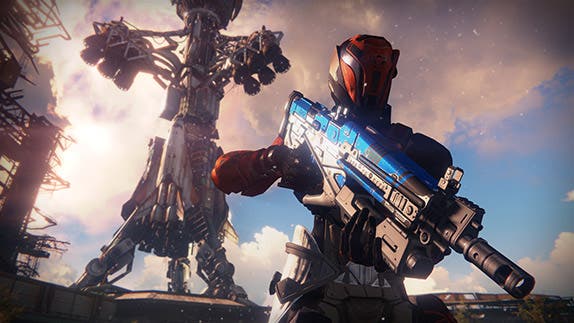
Delays are often bad news for publishers beholden to shareholders, but I'm not sure Bungie thinks of Destiny in quite the same way. I'm not even sure Bakken thinks of Destiny as a game that was delayed. "I don't know when we decided September was our launch date, but when we find out what those things are, because they're sort of nebulous until the people upstairs and the people at Activision decide, this is the right time to do it, from our perspective, we wait until we hear that and then we're like, 'oh s***!'" he says.
"And then we're like, 'okay good, these are things we're going to do, and these are the things we don't have time to do,' because we don't have time for them any more. But rest assured we pack every single thing we can into the game and make sure it's up to a certain quality standard before Harold [Ryan], who is the studio president locks us out of our desks and pulls our hands off of the keyboards because he doesn't want us making changes any more.
"We're basically at that point right now where we're trying to close everything down and put every last bit of awesome into the game."
A Bungie.net weekly update published last month crystallised the "bleary-eyed and exhausted" studio's mood for me. In it popular community chief Eric "Urk" Osborne said status emails flying about the office all carried the same message: "we are ON TRACK".
"Those two simple words in repetition are packed with emotion, and even a tiny bit of relief," he said. "We've been working on Destiny for so long - ages it seems like. For much of the journey, we've been trying to figure it all out, pretending that we could predict the perfect outcome and simply execute, knowing all the while that things are never that easy, and never will be.
"When you have a studio this talented, and this driven, every single moment matters. So, what do we focus on? What is Destiny? Where do we go from here - from this moment - to make sure we're making something that leaps the bar we've set for ourselves?
"We have our answers now.
"We are hurtling towards September 9th. We are on final approach."
Here's hoping for a safe landing.
